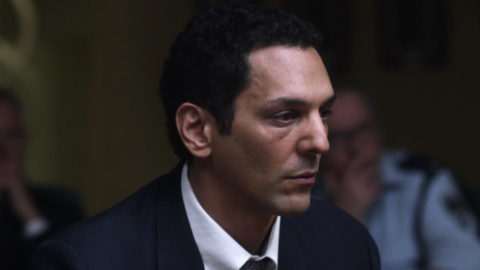Film of the Week: Incitement

The Israeli drama Incitement has all the makings of a tough, unnerving political thriller. It follows the events leading to the 1995 assassination of Israel’s Prime Minister Yitzhak Rabin by a young law student, Yigal Amir. An Orthodox Jew of extreme right-wing views, Amir—played in Yaron Zilberman’s film by Yehuda Nahari Halevi—objected to Rabin’s signing of the Oslo Accords, intended to bring peace to the Middle East. For the religious hard right to which Amir belonged, there could be no compromise with the Palestinians, no mitigation of what the ultra-Orthodox saw as a divinely accorded right to land, laid down in ancient scripture; for them, Rabin was pretty much the devil incarnate, and depicted as such in placards seen brandished in archive footage of anti-Rabin demos.
Empowered by his reading of ancient Talmudic arguments, and—as the film shows it—given at least implicit license to kill by his rabbinical mentors, Amir shot Rabin at a pro-peace rally on November 4, 1995. Any immediate prospects for reconciliation in the Middle East were dealt a severe blow by this national trauma, and by the arrival of Rabin’s eventual successor, right-wing politician Benjamin Netanyahu, still in office today.
Directed by Zilberman—who made 2012’s classical music drama A Late Quartet—and co-written by him and Ron Leshem, Incitement is a film in a familiar mode. It’s the portrait of a lone fanatic, focusing on the everyday life of an arresting, not entirely unsympathetic but clearly troubled rogue male. You might think of The Assassination of Richard Nixon (Niels Mueller, 2004) with Sean Penn as would-be killer Samuel Byck, or indeed of Taxi Driver and its latter-day derivative Joker. But while these latter two films follow their antiheroes’ journeys towards irreversible disturbance, Incitement’s Yigal Amir seems to have been swimming in the waters of extremity before the drama starts. In one scene, he meets an old Army comrade, who reminisces about how brutal Amir used to be as a soldier dealing with Arabs, smiling when roughing them up: the man tells this story almost fondly, suggesting that the madness Zilberman points to is not Amir’s alone, but is embedded in an entire culture.
In fact, Incitement depicts two Israels. One is the liberal, partly secular nation that looked to Rabin and Foreign Minister Shimon Peres to broker an end to an era of hostility. This is the Israel we see gathered enthusiastically at the pro-peace rally shown in archive footage at the end of the film—the event at which Rabin was killed. The other Israel shown is a profoundly reactionary one, in which ancient religious arguments can be invoked to justify (or indeed encourage) actions like Amir’s.
As played by Halevi, Amir is a clean-cut, handsome young man of energy, initiative, and charm—and a natural trickster. Early on, he’s apprehended by a cop as he rages against Rabin at a demo. He first pleads, with seemingly faked panic, that he’s a law student whose career will be wrecked if he’s arrested, and when that doesn’t work, he says his fiancée will dump him—and that gets him off the hook. At the very end of the film—these two acts of chutzpah neatly bookending it—he rather more insouciantly buddies up with a security cop to get close to his target.
Much of the film shows Amir living an unremarkable, comfortable home life with his family, Yemenite Sephardi Jews; his mother (a forceful performance from Anat Ravnizky) combines expansive hospitality and a quite fearsome belief in her son, whose name Yigal, she explains to his prospective girlfriend Nava (Daniella Kertesz), marks him out as someone destined to “bring total redemption.” He later meets another young woman, Margalit (Sivan Mast), the seemingly worldly daughter of a rabbi who proves to be very attuned to Yigal’s militancy. In fact, the real Amir seems to have been a seductive figure in his time: the 2015 documentary Beyond the Fear, by Herz Frank and Maria Kravchenko, is about Amir and his wife Larisa Trembovler, who married him when he was already in prison.

Among the disturbing revelations of Incitement is just how much love and respect a killer can command. Early on, we learn of the atrocity committed by Dr. Baruch Goldstein, an extremist who slaughtered Muslims at prayer in Hebron in 1994. Amir is seen driving through the rain to attend his funeral, then listening to the words of an admiring rabbi who praises Goldstein’s “heart”; Amir himself later calls Goldstein as “a saint,” quoting an ancient dictum, “He who kills shall be rewarded.” There’s a great deal of arcane lore invoked, Amir constantly looking to the old texts—including the writings of 12th-century scholar Maimonides—to justify his actions in the modern day. Musing on the laws governing the correct action to take with “informers” and “pursuers” (different definitions of traitors to Jewry), Amir consults a number of rabbis, who do nothing to persuade him from drastic action against Rabin—who by then has already supposedly been placed under an ancient kabbalistic curse, the pulsa denura. But perhaps even more troubling than the anathema declared by these elders is the language used by opposition politician Netanyahu, who accuses Rabin and Peres of collaborating with the PLO, of basically being “enemies of the people”—a form of political rhetoric which, as we know, has become increasingly, disastrously fashionable around the world in our own time.
Incitement is an extremely interesting film because of the story it tells, and is altogether watchable—but it’s rather lacking in lightness, humor, or grace. There are too many scenes in which political, ideological, and religious beliefs are debated in great detail by Amir and fellow extremists, or by the religious sages who quietly and in reasonable tones invoke the merciless diktats of antiquity, or divinity. The most awkward scene, perhaps, comes in the Amir family kitchen, with Yigal raging at his peaceful, thoughtful father as the old man disparages his son’s murderous talk: it’s an exchange of positions, but entirely undramatic.
I’m aware that it might seem a bit contradictory to complain that Incitement lacks drama, when a no less talky and considerably more theatrical approach was previously taken, but more effectively, by another film on the same topic. Amos Gitai’s 2015 Rabin, the Last Day used a detached and austere dramatic framework, incorporating archive footage, to pursue an inquiry into Amir’s case, and to give a broad sense of the political and religious milieu in which he moved. Gitai, as is his cinematic style, offered a somewhat more contemplative, impersonal take on the story, but the film was no less troubling for all that. What is lost in Zilberman’s take is not that we sympathize with or understand Amir too much—even if, reading this as a fictional version of events, we tend to fantasize that some sane person, like his father or Nava, will intervene to turn him from his path. The problem is simply that we focus so closely on the sheer force of Yigal’s obsession and self-belief that the story becomes more personal and less political, and so compensates by doggedly spelling out the issues at stake.
That said, the scenes that work best introduce some personal mundanity to the depiction of Amir’s crazed trajectory, like when his sidekick Dror balks at collaborating with his friend because Amir isn’t honoring his promise to hitch him up with his younger sister. The film is also good on the strange interface of intimacy and Orthodox mores, as in the scene of Amir’s first date with Nava, where they discuss the sort of things that don’t normally come up in secular dating: she confides that she’d like to have four or five children, perhaps six.
Halevi’s Amir is very watchable, his dashing intensity almost persuading us (some of the time, at least) that we are seeing a driven idealist rather than a deranged fanatic; shots in which DP Amit Yasour’s camera bombs along close to him, Dardennes style, keep us closely locked in Amir’s own purview. Still, the film would be a lot more elegant, a lot lighter in its dramatic rhetoric, if the soundtrack didn’t keep reminding us that something baleful and ominous is at hand. In real life, there are no bass booms or tinnitus-like ringing to tell us when catastrophe is looming.
Jonathan Romney is a contributing editor to Film Comment and writes the Film of the Week column. He is a member of the London Film Critics Circle.






